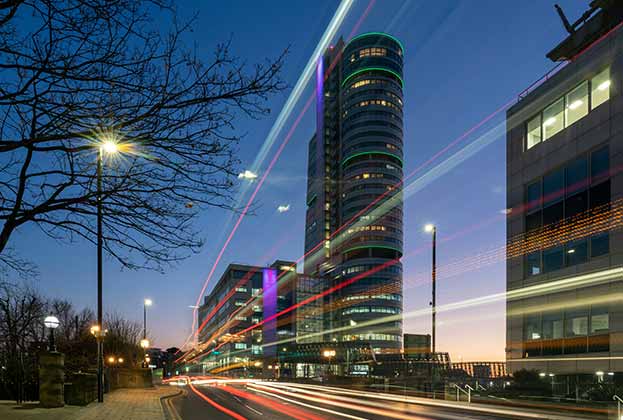While we’ve seen recent headlines surrounding the turbulence in big tech, on a local level, tech in Bristol has gone from strength to strength. Through increased later-stage venture capital funding, tech has established itself as the most active office occupier group in Bristol and has more than doubled its average deal size over the last 10 years.
Furthermore, Savills Tech Cities Report ranked Bristol in the Top 12 Tech Cities globally for ’deep tech’, an industry area that spans advanced materials and manufacturing, artificial intelligence, biotechnology, blockchain, robotics and electronics.
So what is it about Bristol that makes it an attractive location for tech?
Education and tech
The University of Bristol has a strong track record in contributing to the development of the UK quantum industry, originating a third of all UK quantum start-ups. The University also has Europe’s largest robotics department, with a number of tech courses enjoying close links to research institutes and labs for opportunities after graduating. Bristol has approximately 2,000 graduates entering the professional, scientific and tech sectors annually – this equates to 19 per cent of all graduates (higher than all comparable regional cities).
Supporting Bristol’s position as a top-12 ‘deep tech’ Tech City is its growing ecosystem of spin-outs and start-ups, with a legacy of interesting and successful companies set up by alumni from local universities including Science Creates and SETsquared. This, combined with other factors, means that graduates are keen to stay within the city after completing their degrees, further establishing Bristol’s technology ecosystem going forward. A key factor in Bristol’s success is having dedicated lab spaces for tech graduates to use to develop their ideas. The Bristol Robotics Laboratory (BRL), a centre for innovation focused on the understanding of science and home to over 450 academics, researchers and industry practitioners, was created to help staff and students commercialise their business ideas and is at the heart of UWE’s new University Enterprise Zone (UEZ).
The University of Bristol has launched its pre-incubator programme in a bid to help create more deep tech start-ups in the city. The QUEST programme, spun out of its Quantum Technology Enterprise Centre (QTEC), is a six-month programme for UK university researchers who are looking to commercialise their tech. Since 2016, QTEC has supported the creation of 28 active companies with a combined valuation of over £120 million. Runway, the University’s key start-up programme, also provides mentoring and a tailored plan for each business that is based within the Centre for Innovation and Entrepreneurship. Science Creates, set up in 2017, is another example of a deep tech incubator, supporting more than 100 start-ups in state-of-the-art laboratories, offices and event space. Both are operated in partnership with the University of Bristol and Research England.
Innovation led growth
In light of continuing technological advancements and venture capital investment, Bristol is now the fifth-fastest-growing tech city in the UK according to the Digital Economy Council’s Levelling Up Power Tech League report. Tech has been the fastest-growing office-based employer, with 73 per cent job growth over the last ten years, and is expected to rise a further 18 per cent by 2032.
Tech’s also been the most active sector in the office market in four of the last five years, in terms of both total take-up and number of deals completed, at 930,000 sq ft of take-up. The biggest tech deal in 2022 was by Paymentsense which acquired 55,000 sq ft of space at CEG’s EQ building.
One trend of particular note within the sector is the average annual deal size. This comes as start-up tech companies in the city grow and new occupiers enter the market to capitalise on what Bristol has to offer.
Its tech innovation, world-class universities, large talent pool and spin out culture makes Bristol a high flyer for tech skills and investment now and in the future.

-impact-the-office-sector(1).jpg)

.jpg)






